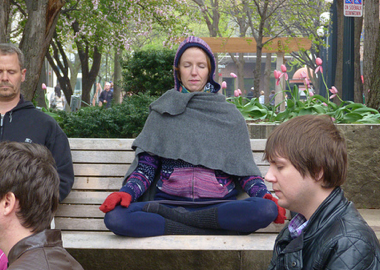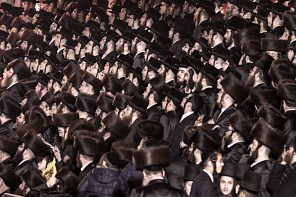What does Buddhism have to be, in order for it to be kosher?
This is what I struggled with, reading James Atlas’ essay “Buddhists’ Delight,” which for several days this week was the NY Times’ most emailed article. I happened to read the piece while at the Mind & Life Summer Research Institute, a gathering of 200 or so scholars and practitioners studying the intersections of meditation, neuroscience, and clinical psychology—a conference representing the cutting edge of the same movement Atlas discussed in his essay.
A bit of personal disclosure, and comparison. James Atlas is a distinguished sixty-something editor, author, and former Rhodes Scholar whose career I would love to have someday. I am a forty-something writer who has spent many months on meditation retreat, in contrast to Atlas’ four days, and written a couple of books on the subject. In my positioning of our two lives, he represents the literary elite cautiously exploring Buddhist meditation, whereas I occupy a marginal position—I am someone who has done so much contemplative practice as to render me less effective as a translator of it.
For a skeptical, intellectual New York Times reader, Atlas is the most effective translator I can imagine: he’s not just kosher, he’s glatt kosher. And, sure enough, he acknowledges several times in “Buddhists’ Delight” (I know from experience that titles are usually not written by journalists, and I’m going to hope he didn’t come up with that one), the anxieties and fears of his presumptive audience. Yes, it’s a little ridiculous to go on retreat in Vermont. Yes, I know, “nightstand Buddhists” who use words like “sitting” (to describe meditation) are faintly ridiculous.
Atlas has to hedge in this way to be credible, relatable. Exactly what I, with my five months of silent retreat, am not.
Like Elizabeth Gilbert in Eat, Pray, Love, what Atlas describes is not particularly unusual; he goes on retreat and is able to have some moments of quiet, and some other moments of calm reflection. Many people have these experiences, which is precisely the point. Atlas isn’t a dharma hero, he’s a kind of everyman. Forget the National Book Award nomination; in this context, he’s just a smart, respectable guy who makes meditation seem almost reasonable.
There is something quaint about this. Atlas had never heard of “engaged Buddhism”—the approach to Buddhist practice that joins contemplative work with political action—and mistakenly identifies Jack Kerouac as an expositor of it. He reads a couple of books on Buddhism, and is pleasantly surprised to find them pragmatic. He scare-quotes the phrase “loving kindness,” as if the Pali term metta (“lovingkindness,” one word, no quotation marks) requires critical distance. My hunch is that this is a kind of affectation, a tactical deployment of skepticism and I’m-new-to-this innocence. I hope so.
The kosher Buddhism presented in “Buddhists’ Delight” is basically relaxation. Not so relaxed that we forget about our liberal political commitments, but relaxed enough that we don’t check our Blackberries when they buzz. Interestingly, right after I read Atlas’ essay, I went to a session at the Mind and Life conference on new clinical studies showing the efficacy of mindfulness in lessening the agony of cancer patients. I appreciated Atlas’ gentle teasing of the motivations of Buddhist seekers (note: the Buddhist Jews among us are “BuJus,” not “Juddhists”), which roughly amounted to seeking some peace in an upset world. Then again, I think those cancer patients may make a stronger case.
I hope that Times readers of Atlas’ personal essay will be inspired to take up meditation practice, because my experience, as both a practitioner and a teacher, is that it promotes much more than relaxation. It opens the heart, it clarifies the mind; like the torso of Apollo in Rilke’s poem, it often demands, “you must change your life.” And if the thirst for “balance and harmony” (Atlas’ words) is the inspiration for practice—well, why not? If Atlas’ presentation of Buddhism seems trivial at times, that same smallness of scale makes it approachable.
Western Buddhism is fortunate that, so far at least, there’s very little missionary zeal about it. (Some profiteering, sure, but at least there are no Buddhists knocking on your door and inviting you to consider the Four Noble Truths.) In a way, introductory essays like Atlas’ are the closest thing to it. It’s a beginner’s tale, like the blog posts of Jewish kids going to Israel for the first time, or Mormons heading out on mission. It’s sweet, in its way, and watered down, and I hope it does some good.





